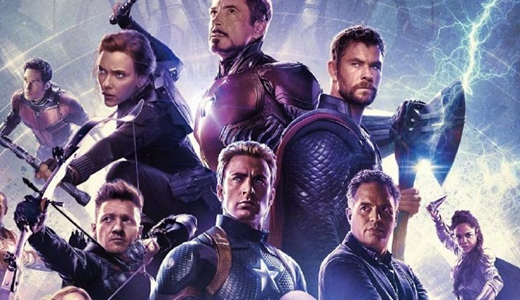Endings are hard.
They’re hard to write. Hard to film. Hard to watch. (Just ask the creators of Lost, for example.) That’s because the more beloved a fictional set of characters is, the more investment we have in them. The more we have at stake.
Which brings us to Avengers: Endgame, the culmination of 11 years and 22 films in a place we’ve come to know as the Marvel Cinematic Universe. Though each of these films has stood alone in some ways, they’ve all been woven into a larger tapestry that comes together in the fourth and final Avengers film (At least, this iteration of the Avengers, that is.)
So much at stake. So many ways to go wrong, and not stick the landing.
But according to many critics, they did just that.
You can read our full review a bit later this afternoon. But if you’re scanning other reviews, the word that keeps popping up is epic. Gizmodo reviewer Germain Lussier titled her review, “Avengers: Endgame Is Overwhelmingly Epic and Immensely Satisfying.” And you’ll find plenty more titles like that one. Currently, the much-anticipated climax to this series stands at 97% fresh on Rotten Tomatoes, a number that definitely makes you wonder what those cranky 3% were thinking.
Endgame has already opened in China, where it scored a massive opening day take of $107.2 million in that market, the biggest debut ever there. Stateside, industry mavens are now predicting the film will make between $260 and $285 million over its opening weekend here. Some are even speculating that the film’s massive global opening could net $1 billion … in its opening weekend.
But the film’s biggest hurdle to hitting the high end of those estimates comes down to simple math. CNBC’s Sarah Whitten explains:
Then there is the run time of the film—three hours, two minutes. With an additional 30 minutes tacked on for previews and 30 minutes for cleanup at the end of the film, a theater can only show “Endgame” about three times in a 12-hour period.
To overcome that barrier, some theaters have announced they’ll be screening the movie 24 hours a day. And the Wall Street Journal also reports that other movies currently in theaters, including Shazam!, Hellboy, Little and Pet Sematary, will fall victim as well as the movie gobbles up screens. Gabriel Saluan, who owns a six Atlas Cinemas in northeast Ohio, told the Journal that at one 16-plex location, 13 of the theaters screens would be devoted to Endgame.
The upshot: if you want to see anything else in theaters right now—especially faith-based films such as Breakthrough and Unplanned—best to do it before Thursday night.
Speaking of Unplanned, the dramatic story of Abby Johnson’s journey from Planned Parenthood clinic director to pro-life advocate has earned $17.3 million as of Monday. And Rev. Rev. Patrick Mahoney, director of the Christian Defense Coalition, said of his group’s plans regarding the film, “Our hope is to launch a nationwide campaign to eventually show Unplanned in front of Planned Parenthood abortion clinics across America.”
The film’s director, Chuck Konzelman, testified before the Senate Judiciary Committee’s Subcommittee on the Constitution and said that 94 abortion clinic workers had decided to leave their jobs after seeing the movie. “One percent of the abortion workers in the United States, after getting one look at them being portrayed on film have decided to change their lives … and what they do for a living”
Then there’s the Christian movie Breakthrough, a film about a teen who plunges into an icy lake, dies, and is revived by his mother’s prayers. In an interview with the Christian Post, star Chrissy Metz (best known for her role on the hit NBC drama This Is Us) said of her own prayer life,
I believe in God, and so I ask God, what it is that I should be doing and whatever His will is for me, and that I could set my own ego and pride aside and be willing and be open, to talk to me in ways that I will understand.
In other screen-based news this week, the World Health Organization has issued new guidelines for children’s screen time: no screen time for babies under the age of two, and one hour (or less, preferably) for children up to the age of 4. And a study conducted by researchers at the University of Alberta’s Faculty of Medicine and Dentistry found correlations between screen-time use among young children and behavioral problems later on. The study’s main author, Sukhpreet Tamana, said of the findings,
The two big takeaways from this study are that children exposed to more screen time, at either age three or five years, showed significantly greater behavioural and attention problems at age five, and that this association was greater than any other risk factor we assessed, including sleep, parenting stress, and socioeconomic factors.
And screen-time problems for older kids aren’t easily overcome either, according to another study published in the journal Computers in Human Behavior. Researchers from Brigham Young and Loyola universities noted that a “digitally immersive environment” can create a pathological dependence on technology for a small percentage of teens, which correlates with depression, anxiety and health self-regulation.
Finally this week, actress Nicole Kidman opened up to Vanity Fair about her decision, along with country rocker husband Keith Urban, to raise their two children (Sunday Rose, 10; Faith Margaret, 8) in the Catholic Church. She told the magazine, “A lot of my friends tease me,” for her convictions. But she also knows firsthand the power and influence of a faith-filled family: “That’s how we are raising our children. Keith has his own beliefs but he comes, too. I had a very Catholic grandmother, and I was raised praying, so that had a massive impact.”






Recent Comments